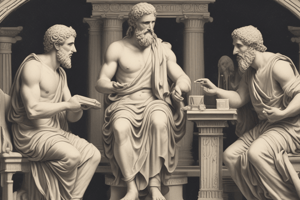Podcast
Questions and Answers
What was Socrates charged with according to the text?
What was Socrates charged with according to the text?
- Believing in supernatural things of his own invention
- Committing acts of treason
- Corrupting the minds of the young (correct)
- Believing in gods recognized by the State
What made Socrates appear virtuous in front of the politically charged event?
What made Socrates appear virtuous in front of the politically charged event?
- His rhetorical defense addressing the jury
- The framing by Plato (correct)
- The false impression created by his opponents
- His opponents' malicious suggestions
How did Socrates' opponents influence the jurors to believe he was committing an injustice?
How did Socrates' opponents influence the jurors to believe he was committing an injustice?
- By supposedly making the weaker argument defeat the stronger
- By expressing persistent hostility and malicious suggestions (correct)
- By addressing the misconceptions that led to his unpopularity
- By creating a negative public image through a play by Aristophanes
What term was applied to Socrates due to his opponents' hostility?
What term was applied to Socrates due to his opponents' hostility?
How did Socrates begin his defense before the jury?
How did Socrates begin his defense before the jury?
What was the impact of Socrates' opponents on creating a negative public image of him?
What was the impact of Socrates' opponents on creating a negative public image of him?
What philosophical concept is exemplified by Socrates' use of questioning and cross-examination in political discourse?
What philosophical concept is exemplified by Socrates' use of questioning and cross-examination in political discourse?
In what context did Socrates prioritize philosophical pursuits over political involvement?
In what context did Socrates prioritize philosophical pursuits over political involvement?
What did Socrates claim as the cause of his unpopularity?
What did Socrates claim as the cause of his unpopularity?
Which of the following did Socrates refuse due to his beliefs?
Which of the following did Socrates refuse due to his beliefs?
What did Socrates emphasize as the reason for his long life?
What did Socrates emphasize as the reason for his long life?
What was unique about Socrates' approach to giving advice?
What was unique about Socrates' approach to giving advice?
What did Socrates describe as a cycle of labors undertaken to establish the truth of the oracle?
What did Socrates describe as a cycle of labors undertaken to establish the truth of the oracle?
What prompted reflection on ethical responsibilities of political figures and development of civic virtues?
What prompted reflection on ethical responsibilities of political figures and development of civic virtues?
What aspect of governance did Socrates assert was a property of the divine?
What aspect of governance did Socrates assert was a property of the divine?
Why did Socrates refuse to engage in conventional political activities according to the text?
Why did Socrates refuse to engage in conventional political activities according to the text?
What does Socrates claim to be the foundation of his wisdom?
What does Socrates claim to be the foundation of his wisdom?
What prompted Socrates to question and challenge the claims of others?
What prompted Socrates to question and challenge the claims of others?
According to Socrates, what is the central theme of his defense against his accusers?
According to Socrates, what is the central theme of his defense against his accusers?
What did Socrates discover about many people claiming wisdom?
What did Socrates discover about many people claiming wisdom?
How did Socrates handle the accusation of corrupting the youth?
How did Socrates handle the accusation of corrupting the youth?
What was the punishment given to Socrates by the jury?
What was the punishment given to Socrates by the jury?
What does Socrates believe is the appropriate way to live life?
What does Socrates believe is the appropriate way to live life?
How did Socrates view admitting one's own ignorance?
How did Socrates view admitting one's own ignorance?
"No one is wiser than Socrates" implies what according to the text?
"No one is wiser than Socrates" implies what according to the text?
What does Socratic ignorance entail according to the text?
What does Socratic ignorance entail according to the text?
What did Socrates spend his time doing?
What did Socrates spend his time doing?
Why did some people enjoy spending time in Socrates' company?
Why did some people enjoy spending time in Socrates' company?
Why were Meletus, Anytus, and Lycon aggrieved with Socrates?
Why were Meletus, Anytus, and Lycon aggrieved with Socrates?
According to Socrates, what is the relation between goodness and wealth?
According to Socrates, what is the relation between goodness and wealth?
Why did Socrates believe virtue and wisdom are unteachable?
Why did Socrates believe virtue and wisdom are unteachable?
What did the Pythian Priestess claim about Socrates?
What did the Pythian Priestess claim about Socrates?
Why did Socrates consider the earliest charges against him more difficult to argue against?
Why did Socrates consider the earliest charges against him more difficult to argue against?
What did Socrates compare Meletus' actions to when questioning him?
What did Socrates compare Meletus' actions to when questioning him?
What differentiates Socrates from the Sophists in terms of objective truth?
What differentiates Socrates from the Sophists in terms of objective truth?
Why did Socrates believe there is poverty in philosophy?
Why did Socrates believe there is poverty in philosophy?
Flashcards are hidden until you start studying
Study Notes
Socrates' Trial and Accusations
- Socrates was charged with impiety and corrupting the youth
- His opponents' hostility led to him being labeled as "pollution"
- His opponents influenced the jurors by portraying him as a threat to traditional values and the state
- Socrates began his defense by questioning his accusers and challenging their claims
Socrates' Philosophical Methods
- He employed questioning and cross-examination to uncover the truth
- This method exemplified the concept of critical thinking and intellectual humility
- Socrates prioritized philosophical pursuits over political involvement
Socrates' Life and Views
- He claimed that his unpopularity was due to his pursuit of wisdom
- He refused to participate in conventional political activities due to his beliefs
- Socrates emphasized that his long life was due to his focus on self-reflection and self-improvement
- His approach to giving advice was unique in that he did not claim to have all the answers
The Oracle and Wisdom
- Socrates described the cycle of labors undertaken to establish the truth of the oracle as a spiritual quest
- He believed that wisdom is the foundation of his knowledge
- Socrates questioned and challenged the claims of others because he believed that wisdom begins with recognizing one's own ignorance
Governance and Virtue
- Socrates asserted that good governance is a property of the divine
- He refused to engage in conventional politics due to his belief in the importance of self-reflection and self-improvement
- Socrates believed that virtue and wisdom are unteachable and can only be acquired through self-reflection and self-improvement
The Trial's Impact
- The accusations and trial prompted reflection on the ethical responsibilities of political figures and the development of civic virtues
- Socrates was sentenced to death by the jury
- He believed that admitting one's own ignorance is the key to wisdom
Socratic Ignorance and Humility
- Socratic ignorance entails recognizing one's own limitations and ignorance
- "No one is wiser than Socrates" implies that Socrates recognized his own ignorance and limitations
- He spent his time questioning and challenging the claims of others, and engaging in self-reflection
Relationships and Perceptions
- People enjoyed spending time in Socrates' company because he made them confront their own ignorance and limitations
- Meletus, Anytus, and Lycon were aggrieved with Socrates because they felt threatened by his methods and beliefs
- Socrates believed that goodness and wealth are not necessarily linked
Philosophy and Wisdom
- Socrates believed that wisdom is not teachable and can only be acquired through self-reflection and self-improvement
- He believed that the pursuit of wisdom is a lifelong journey
- The Pythian Priestess claimed that Socrates was the wisest man in Athens
Studying That Suits You
Use AI to generate personalized quizzes and flashcards to suit your learning preferences.




